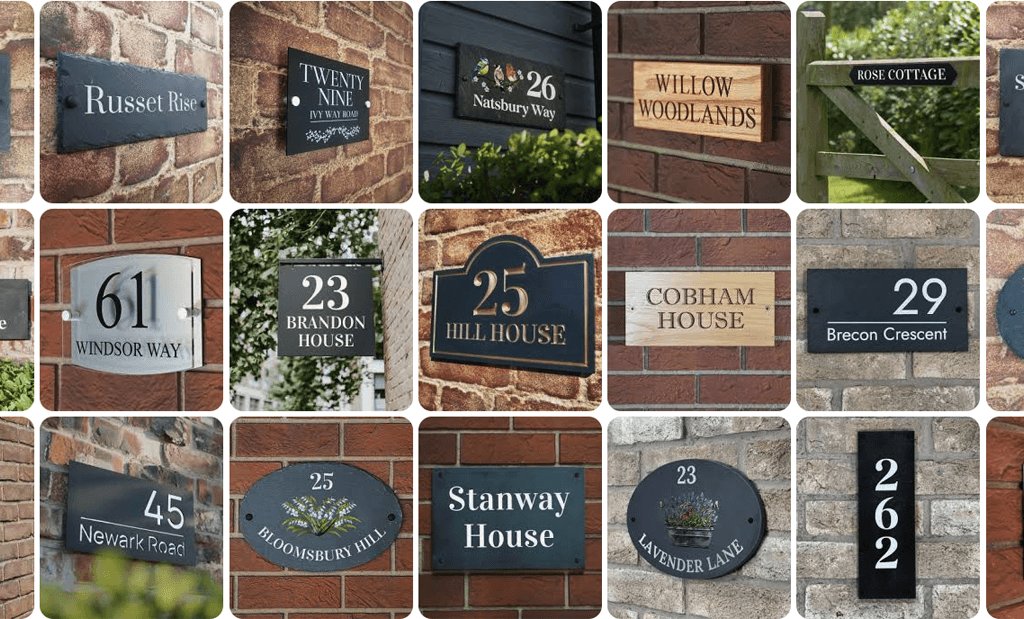
How To Name Your House: Tips, Legal Requirements & Inspiration
Naming your house is a way to infuse your home with personality, history, and a touch of elegance. Whether you’re drawn to something classic like "Rose Cottage" or prefer a name that reflects your love for travel, the process of choosing the perfect name for your abode can be both exciting and rewarding.
But where do you start? And what are the legalities involved?
In this comprehensive guide, we’ll walk you through everything you need to know about naming your house in the UK. From understanding the official steps required to register a new name, to exploring creative inspirations that could add value and charm to your property, we’ve got you covered. Whether you’re renaming an existing home or naming a new build, our expert tips will ensure your house name is not only unique but also meaningful.
Why does a house name matter? Beyond the aesthetic appeal, a thoughtfully chosen name can enhance your property’s identity, make it stand out in the market, and even add a touch of prestige.
Let’s delve into the fascinating world of house naming and discover how you can give your home a name that truly resonates.
Post Overview & Quick Links
- How do you officially name your house?
- Changing an existing house name
- Fees for naming or renaming a house
- Does a house name add value?
- Legal considerations
- How to choose a house name
- What are the most popular house names in the UK?
How to Officially Name Your House

How do you officially name your house?
To officially name your house in the UK, you must follow certain procedures, especially if the property has an existing name or lacks a number. Start by contacting your local council to submit your preferred house name. If the council approves the name, you must then register it with the Royal Mail Address Maintenance Unit to ensure it’s recognised for postal services. The house number must remain visible, and you should use both the number and the new name in your address.
Naming your house is a straightforward process in the UK, but it's important to follow the correct procedures to ensure everything is legal and properly registered. Here’s a step-by-step guide to help you navigate the process.
1. Understand the Legal Requirements
If your house already has a number, you can add a name without needing official permission. However, certain rules must still be followed:
-
The house number must remain visible: The name is an addition, not a replacement. Always display the house number clearly within your property's boundary.
-
Use both the number and the name in your address: For example, "20 Rose Cottage, High Street, London."
2. Changing an Existing House Name
How do I name my own house?
If your property only has a name (no number) or you wish to change an existing name, you'll need to get approval from your local council. Here’s what you need to do:
-
Contact Your Local Council:
-
Submit your preferred house name in writing to your local council.
-
Ensure the name isn’t identical or too similar to other properties in the vicinity to avoid confusion for postal services and emergency personnel.
-
-
Notify the Royal Mail:
-
After council approval, contact the Royal Mail Address Maintenance Unit.
-
They will validate the name and ensure it doesn’t conflict with other addresses.
-
-
Update Your Address Records:
-
Once approved, update your address with all relevant organisations, including utility companies, banks, and your local council.
-
3. Tips for a Smooth Process
-
Research local house names: Before submitting your request, take a walk around your neighbourhood to note existing names. This will help you avoid choosing a name that's already in use or too similar.
-
Have backup options: Councils may reject your first choice if it’s too similar to another property. It’s wise to have a few alternative names ready.
-
Check for potential fees: Some councils may charge a small fee for processing your house name request. Check this on your local council’s website.
4. Quick Reference Table
|
Scenario |
Action Required |
|
House has a number and you want to add a name |
No official permission needed, but number must remain visible. |
|
House has a name (no number) and you want to change it |
Approval needed from local council and Royal Mail. |
|
Adding or changing a house name and ensuring it’s unique |
Research local names, and prepare backup options. |
5. Useful Resources
-
Local Council Contact: Find Your Local Council
-
Royal Mail Address Maintenance Unit: Royal Mail Contact Information
By following these steps, you can ensure that your house name is legally recognised and correctly registered, adding a personal touch to your home while maintaining clarity and order for postal and emergency services.

Costs and Legal Considerations
When naming or renaming your house in the UK, it’s important to be aware of the potential costs and legal implications. These factors can influence both the process and the long-term value of your property.
1. Fees for Naming or Renaming a House
Depending on your local council, there might be a small fee associated with registering or changing your house name. This fee covers the administrative costs of updating records and ensuring that your chosen name is unique within the area.
-
Check with your council: Fees vary by location, so it’s crucial to contact your local council or visit their website to understand the specific costs involved.
-
Additional services: Some councils might also offer additional services, such as fast-tracking the registration process for an extra charge.
Does it cost to name your house?
Yes, there may be a fee to name or rename your house, depending on your local council. These fees typically cover administrative costs for updating records. The cost can range from £25 to £50, though it varies by location. Some councils may also offer additional services, like fast-tracking the registration process, for an extra fee.
2. Impact on Property Value
Does a house name add value?
A well-chosen house name isn’t just a personal touch—it can also enhance the market value of your property. A unique and appealing name can make your home more attractive to potential buyers, particularly if it adds to the property’s charm or highlights its heritage.
-
Potential Value Increase: Some studies suggest that a desirable house name can add up to 5% to your property’s value. This is especially true for names that evoke a sense of history or exclusivity.
-
First Impressions Matter: The name of your house is often the first impression for buyers. A name that suggests a well-maintained, prestigious, or picturesque property can positively influence buyer perceptions.
3. Legal Considerations
When choosing or changing a house name, it’s essential to follow the proper legal procedures to avoid complications.
-
Approval Required: If you’re changing an existing name or naming a house that has no number, you’ll need approval from your local council. This ensures the name is unique and doesn’t conflict with others in the area.
-
Royal Mail Registration: After council approval, the name must be registered with the Royal Mail Address Maintenance Unit. This step ensures your new address is officially recognised and can be used for postal services.
4. Quick Reference: Costs and Legal Steps
|
Aspect |
Details |
|
Fees |
Varies by council; typically between £25-£50. |
|
Value Impact |
Can add up to 5% to property value. |
|
Council Approval |
Required for renaming or naming a house with no number. |
|
Royal Mail Registration |
Mandatory for official recognition of the new name. |
5. Useful Links
-
Find Your Local Council: GOV.UK - Local Council Finder
-
Royal Mail Address Maintenance Unit: Royal Mail Contact Information
Understanding these costs and legal considerations will help you navigate the process smoothly and maximise the benefits of naming your house.
How to Choose a House Name
Choosing the right name for your house is a significant decision that can enhance its character, appeal to future buyers, and reflect your personal style. Whether you’re looking to honour the history of your property, draw inspiration from its natural surroundings, or add a personal touch, this guide will help you select a name that resonates.
1. Consider the Property’s Character
Matching the house name to the style and history of your home is essential. This ensures the name feels authentic and well-suited to the property.
-
Traditional Homes: Names like "The Old Rectory" or "The Coach House" are ideal for properties with a historical background or traditional architecture.
-
Modern Homes: For contemporary builds, consider names like "Vista" or "Serenity" that reflect a sleek, modern aesthetic.
By aligning the name with your property's character, you create a cohesive and appealing identity.
2. Reflecting Historical Significance
Many homes in the UK carry names that reflect their historical use or the heritage of the property. This tradition adds charm and depth to your home.
-
Examples:
-
"The Granary": Perfect for properties that were once used for storing grain, reflecting a history tied to agriculture.
-
"The Forge": Ideal for homes that were formerly blacksmiths' workshops, emphasising a connection to traditional crafts and trades.
-
Consider the original function of your property or any local historical ties when choosing a historically significant name. This can enhance the narrative of your home, making it more appealing to both residents and potential buyers.
3. Drawing Inspiration from Natural Features
Another approach is to name your house after the natural surroundings or nearby landmarks. This creates a serene, picturesque impression that connects your home to its environment.
-
Examples:
-
"Hillside Cottage": Perfect for homes on a slope or hill.
-
"Riverside House": Ideal for properties near a river or stream.
-
Survey the landscape around your home and incorporate local geography, such as names of rivers, hills, or even flora and fauna, to ground your house in its physical context.
4. Infusing Personal Inspiration
For a unique and meaningful name, draw from personal significance. This could be inspired by:
-
Places you’ve visited: Names like "Santorini House" or "Windermere Cottage" can evoke memories of cherished holidays.
-
Family names: Incorporating loved ones' names can make the property feel more personal and homely.
However, when choosing a personal name, consider resale value and how the name will be perceived by others.

What is the most popular house name in the UK?
If you're looking for inspiration, here are some popular and distinctive options:
-
Popular Names:
-
"The Cottage"
-
"The Old Rectory"
-
"The Coach House"
-
"The Stables"
-
-
These names evoke a sense of history and tradition, making them timeless choices.
-
Fancy and Unique Names:
-
"Serenity"
-
"Nirvana"
-
"Vermont"
-
-
These names offer elegance and exclusivity, perfect for making your home stand out.
5. Guidelines for Choosing the Best Name
When selecting a house name, keep these guidelines in mind:
-
Match the Name to the Property’s Style: A grand name like "Manor" might not suit a modest cottage.
-
Consider Future Buyers: A name that appeals to a broad audience can add up to 5% to your property’s value.
-
Keep It Easy to Pronounce: Names like "Maple House" or "Rose Cottage" are straightforward and memorable.
-
Ensure Uniqueness: Check the local area to ensure your preferred name isn’t already in use to avoid confusion.
6. Personalisation and Kerb Appeal
Naming your house is more than just an address; it’s a reflection of your personality, interests, and the history of the property. A well-chosen name can significantly improve kerb appeal, creating a strong first impression that may attract potential buyers.
By following these tips and guidelines, you can select a house name that enhances your property’s identity, adds value, and reflects its true essence. Whether you choose a name that’s historical, natural, or personal, the right name will resonate with both you and future residents.
